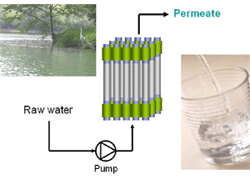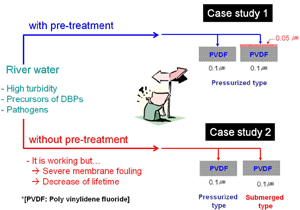
Long-term evaluation of novel pilot-scale membrane systems for drinking water production
| Tel: (011) 706-6267 |
 Researcher:
Researcher:
 Soryong Chae
Soryong Chae
Water Quality Control Eng. Lab.

Research Background:
Membrane filtration using microfiltration (MF) and ultrafiltration (UF) membranes has been widely used to produce drinking water from river, lake and underground water. These low-pressure membranes can remove particulate and colloidal matters bigger than the pore size of the membrane and the filtrate is usually free of turbidity and bacteria. However, membrane fouling that was mainly caused by natural organic matter (NOM), suspended particles, and inorganic matters limits the long-term operation of the membranes.
Research Scope and Objective:
 In this study, two kinds of pilot-scale novel membrane filtration systems for drinking water production have been fabricated and operated to challenge current problems related both to the effective removal of pollutants from water and the reduction of membrane fouling. The performance of the membrane filtration depends on the raw water quality and the operating conditions such as filtration flux, pressure, backwash method, etc. Therefore, the feasibility of the membrane systems should be evaluated by a pilot test before commercialization.
In this study, two kinds of pilot-scale novel membrane filtration systems for drinking water production have been fabricated and operated to challenge current problems related both to the effective removal of pollutants from water and the reduction of membrane fouling. The performance of the membrane filtration depends on the raw water quality and the operating conditions such as filtration flux, pressure, backwash method, etc. Therefore, the feasibility of the membrane systems should be evaluated by a pilot test before commercialization.

[Materials and Methods]:
- Case study 1:Comparison of performance and membrane fouling between homogeneous and non-homogenous membranes with pre-treatment.
- Case study 2:
Comparison of performance and membrane fouling between pressurized and submerged membranes without pre-treatment.
